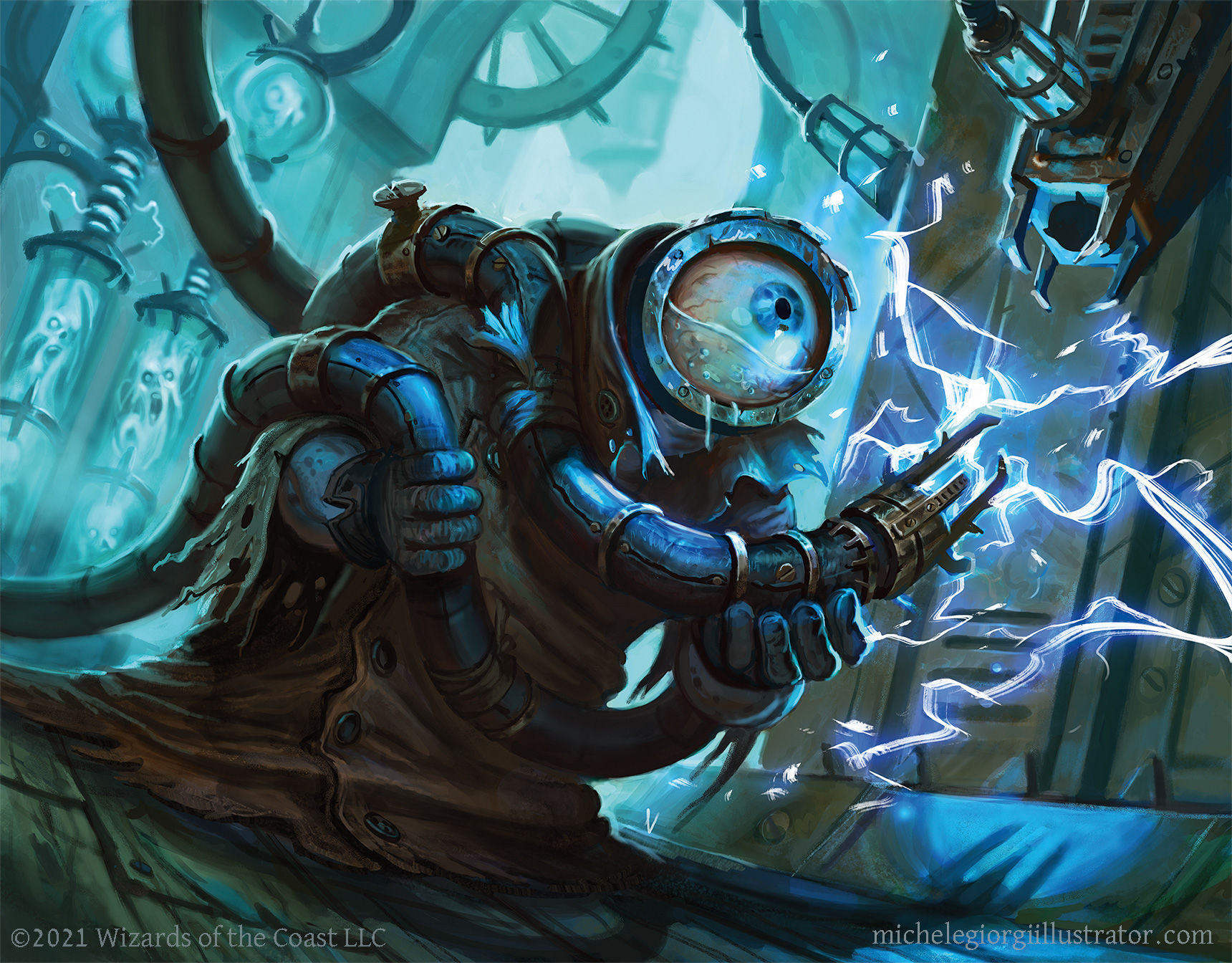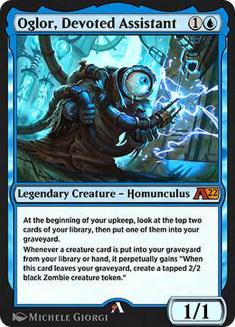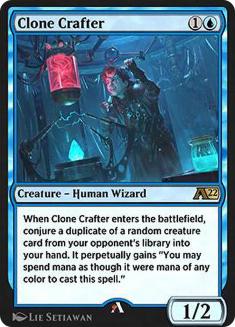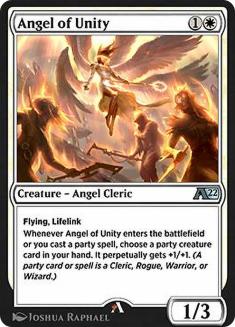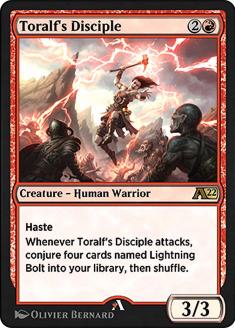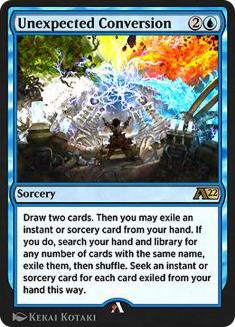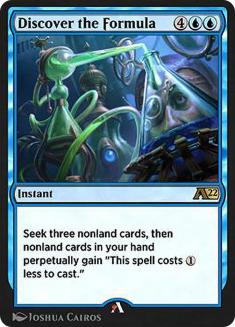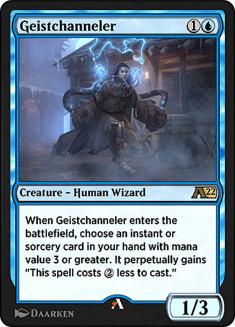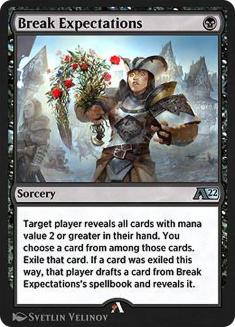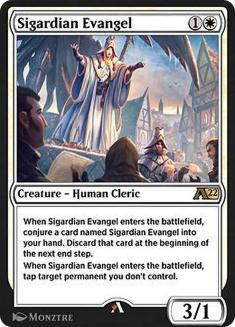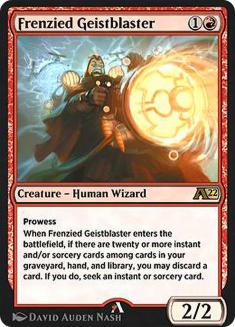One week in and I’m pleased to report that I’m having a great time playing Alchemy. It’s not a perfect solution to all of Magic’s recent woes, but it presents games a lot closer to the type I want to be playing, and the deckbuilding remains miles better than its Standard counterpart.
A few weeks ago, I sat down to write an article about overrated and underrated cards from Innistrad: Crimson Vow. I gave up out of sheer frustration. Things felt very solved, and nothing about the format was all that surprising. With a few simple adjustments to the metagame as well as a willingness to explore previously unexplored spaces, Alchemy: Innistrad has defied my expectations in many ways. While I still like my pick of Key to the Archive as the most impactful card in the set, very little about the rest of my first Top 10 list would remain the same. This is great news, as Magic’s capacity to surprise is a large part of what keeps me coming back for more.
Let’s talk about some of the specific cards that have either exceeded or come up short of my pre-release expectations.
Overrated
Oglor, Devoted Assistant
Granted, when I included Oglor, Devoted Assistant on a list of Alchemy cards I was fond of, I did so with extreme caveats. I wasn’t sure that there was a home for Oglor, but it seemed like if there was, its potential output exceeded anything in the set. Well, I’ve got good news and bad news. The good news is that I found a framework that sort of does the thing I envisioned Oglor doing.
Creatures (30)
- 1 Umara Wizard
- 4 Tangled Florahedron
- 4 Blackbloom Rogue
- 4 Glasspool Mimic
- 1 Kazandu Mammoth
- 4 Egon, God of Death
- 4 Deathbonnet Sprout
- 4 Cobbled Lancer
- 4 Oglor, Devoted Assistant
Lands (15)
Spells (15)

Cool, right? Now for the bad news. It’s just awful. And not in the “wait until we get a few more pieces” kind of way. Oglor just needs way too much to go right before it ever starts producing significant battlefield presence. First, its shaky 1/1 body must survive. Even when that happens, output is limited to how many creatures you can move to the graveyard in a brief period. The nature of Oglor’s deckbuilding restrictions means that your deck won’t be capable of doing much besides setting up Oglor.
I want to try to build a less all-in style of Oglor deck, but what does that even look like? In the absence of truly absurd self-mill, I just don’t see Oglor ever crossing the finish line. It’s possible that some truly outlandish combination of cards still breaks this in Historic (think Charbelcher in Modern), but I’m done holding my breath for Oglor. Let my wasted mythic wildcards be the only ones that get spent.
Clone Crafter
Clone Crafter does exactly what was advertised. It provides a specific resource tied to a cheap body. Seems like an easy enough slam dunk in certain contexts, and I do still think Clone Crafter is solidly playable. But it’s not great, mostly because so many other cards in the set are doing such similar things, and they aren’t requiring you to rely on your opponent’s tools. If you don’t want your deck to run out of things to spend its mana on, then it just won’t. Where I thought Clone Crafter was destined to see play literally everywhere, turns out it’s got three specialized roles.
- Get blinked by Teleportation Circle
- Get extra Hullbreaker Horrors in control mirrors
- Be a Wizard and complete a Party
Speaking of parties…
Angel of Unity
I really wanted Angel of Unity to be the thing that made jumping through the party hoop worth it. The theory was that the aggro decks in Standard provided enough versatility and raw power that stretching to execute a party setup could never be worth it, but a little nudge in the raw power direction could make partying up a real thing in Alchemy. Here’s where my attempts left me.
This deck is good! If you’re required to enter a tournament with a Party deck, I’m not sure you could do much better, honestly. But in the real world, you can just not play cards with the word “Party” on them. And yeah, that deck is still better. We’ll talk more about that in the underrated section, but this deck never really recovers from the absence of Brutal Cathar or Skyclave Apparition in large numbers.
Toralf’s Disciple
I already didn’t think this card was all that good. It’s somehow worse than I expected. I have played against this card a lot. None of my opponents have ever actually cast a Lightning Bolt against me. Even if they did, it almost certainly would have been better as any card already in their deck. This card is cute. It is not Constructed playable.
Underrated
Unexpected Conversion and Discover the Formula
Totally willing to give myself a pass on underrating these two cards, since they’re like nothing we’ve ever really seen before in the Magic world. Unexpected Conversion reads like a Divination with a small amount of upside sprinkled in. In reality, it’s a tool that fundamentally changes how we can build decks. Dead cards in specific matchups are just something you learn to accept as a Magic player. I may not want Fading Hope in a control mirror, but I’ll try to find someway to eke out a little bit of value with it.
With Unexpected Conversion in the mix though, your deck is constantly getting better just by virtue of playing the game. Perhaps the biggest gainer from Unexpected Conversion’s printing is Jwari Disruption. Jwari Disruption is an absolute house for control on Turns 2, 3, and 4 of the game when either missing a land drop or letting an opponent operate unimpeded can end the game before your deck really has a chance to do its thing. As the game goes long though, neither side of Jwari Disruption is what you are looking for. You’ve got the mana you need, and it’s unlikely to counter anything.
Turning a copy in your hand into a guaranteed spell and removing the possibility of drawing a Disruption for the rest of the game is a dramatic improvement in the quality of your deck. With Unexpected Conversion available, I’m happily maxing out on Jwari Disruption in all of my control decks, and doing so has yielded huge returns early on in games.
Discover the Formula was hard to contextualize because I’ve never really played a draw spell that always brought straight fire to the table. Six mana seems like a lot for three cards, but when the cards are always good, and the card refunds mana back to you on future turns, Discover the Formula turns into a bargain. It’s possible that the best thing to do in the format is to copy Discover the Formula with Galvanic Iteration. It’s hard for any deck to keep pace with the tempo and raw card advantage that play offers.
Geistchanneler
It’s cost reduction. I really shouldn’t have to say more. Moving spells like Discover the Formula or Alrund’s Epiphany down the curve is one of the most unfair things you can do in Alchemy. This list I’ve been playing lately is great for illustrating just how out of hand things get when you start leveraging cost reduction in spades. The Mono-Black matchup is rough, but this is about as big as you can go in this format.
Creatures (6)
Lands (10)
Spells (44)

A Geistchanneler leads to a cheaper Discover the Formula, which leads to a cheaper Key to the Archive and Alrund’s Epiphany, which leads to more Discover the Formula, and it all gets very silly very quickly. The format really needs something to keep shenanigans like this in check.
Break Expectations
And it has it! This was a subtle and smart edition to the Alchemy card pool which should help things from scaling out of control. This challenges Discover the Formula, Hullbreaker Horror, Alrund’s Epiphany, Goldspan Dragon, Town-razer Tyrant, Key to the Archive, and many other key threats in Alchemy. No one seems to be playing it out of fear of giving their opponent a Weapon Rack though. It will be okay, I promise. Break Expectations is odd, but exactly what black decks will need when the format starts adjusting to them.
Sigardian Evangel
Is this the best finisher white-based aggro has ever had? Sigardian Evangel is almost impossible to play a long game against, generating battlefield presence and breaking stalemates. Effects like this are usually good in very specific spaces, but Sigardian Evangel shines against control, midrange, and aggro. Contending for the best deck in Alchemy is Azorius Aggro, in no small part due to Sigardian Evangel.
This is the deck that really supersedes my aforementioned Azorius Party deck. Thalia, Guardian of Thraben is just a better card than Archpriest of Iona. Who knew? These lists are everywhere right now, and my only real point of differentiation from the stock lists is a fun-of Teleportation Circle. I do think the return is worth it in games where you curve into it, but you certainly never want to draw multiples. Azorius Aggro is quickly cementing itself in the top tier of Alchemy, alongside decks like Izzet Hullbreaker, Mono-Black Control, and Mono-Red Dragons.
Frenzied Geistblaster
Y’all spend months trying to make Delver of Secrets happen and then you don’t even give Frenzied Geistblaster the time of day? Ice cold. Geistblaster really could be the turning point for the archetype, along with some help from some of the other luminaries on my “underrated” list.
Creatures (12)
Lands (10)
Spells (38)

There a few things going on here that distinguish this list from past attempts at the Izzet Delver archetype. First, we’ve finally got a way to maximize copies of Jwari Disruption without getting super-punished as the game goes long, thanks to Unexpected Conversion and Frenzied Geistblaster. How about dead removal in control matchups? Not anymore!
We’ve also got access to more expensive and more powerful effects thanks to the cost reduction of Geistchanneler and, in turn, Discover the Formula. These cards play extremely well with the Lesson package provided by Divide by Zero, ensuring there’s always cardboard to reduce costs on.
Similarly, Frenzied Geistblaster is more than happy to convert some of those less impactful Lessons into real cards. The ability to pitch a Galvanic Iteration to Frenzied Geistblaster means that you’ll have reliable access to two-for-ones at all points in the game.
Put all of this together and you’re left with a Delver of Secrets deck that’s finally able to do Delver-like things. It can get on the battlefield early with a meaningful threat, but it also has the required threat density to play a long game, and it’s able to keep up with other decks on the raw power scale. This deck plays a lot of different styles and can add even more to its quiver as the format adapts. Keep tuning this and I think there’s something here.
I’ve got no real reason to sell you on Alchemy. Most of the complaints I’ve heard about the economics surrounding it are more than fair. Still, this is the most fun available in Magic right now. If I seem a little reinvigorated, its mostly thanks to Alchemy. It’s weird, it’s different, it’s expensive, it’s ever-changing, and, most importantly, it finally feels like something that is for me.
In an era where Magic often feels like its trying to shake players like me off its bandwagon, it feels good to have a space that’s obviously tailored to the most obsessive.

